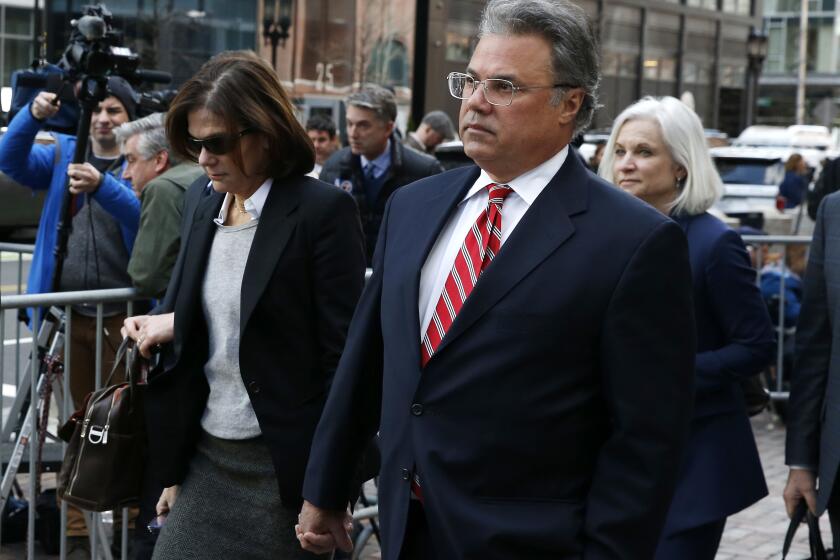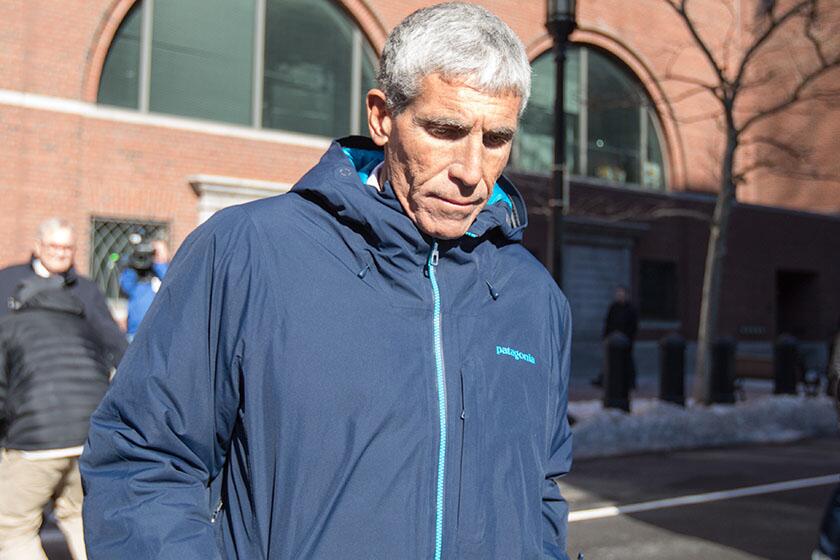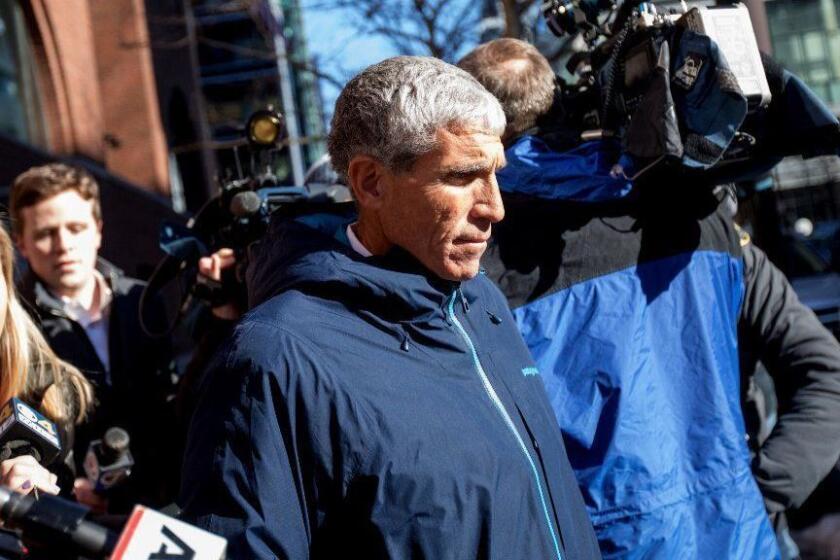Facing prospect of added bribery charge, four parents plead guilty in admissions scandal

- Share via
Charged with felonies and excoriated by the public, the ex-bond fund manager, the philanthropist, the venture capitalist and his wife nevertheless maintained their innocence for months, even after prosecutors in the college admissions case threatened — and made good on their threat — to charge them with a second crime if they didn’t cut a deal.
But facing the prospect last week of being charged with a third felony, Douglas Hodge, Michelle Janavs and Manuel and Elizabeth Henriquez buckled, their reversals affirmed in Boston federal court on Monday when all four pleaded guilty to conspiracy to commit fraud and money laundering.
Their guilty pleas marked a potential turning point in the closely watched admissions scandal that, until last week, appeared to have settled into two camps: Parents who had admitted their guilt early on and resigned themselves to spending some amount of time in prison, and parents who had vowed to clear their names at trial.
Court papers filed on Monday show that a fifth defendant, Martin Fox, an alleged conspirator of the admissions scam’s ringleader, William “Rick” Singer, will change his plea to guilty and cooperate with the government.
Of the 52 people charged in the scandal, 29 have pleaded guilty or said they plan to do so.
Monday’s guilty pleas from Hodge, Janavs and the Henriquezes — who were viewed as facing more prison time, if convicted, than many of Singer’s other clients — underscored the pressure the government is exerting on parents who have maintained their innocence.
Federal prosecutors accused top CEOs, two Hollywood actresses and others of taking part in an audacious scheme to get their children into elite universities through fraud, bribes and lies.
Prosecutors had warned parents that a new indictment, carrying an added charge of federal program bribery, could be unsealed as soon as this week, people familiar with the negotiations said. The charge can be leveled at anyone accused of bribing an employee or agent of an organization that receives $10,000 or more in funding from the federal government, and who obtains something valued at $5,000 or more in exchange.
Patric Hooper, an attorney representing a Bay Area couple charged in the case, Amy and Gregory Colburn, expressed frustration with what he described as the prosecution’s efforts to press parents into folding.
“It’s very troubling that the government is considering adding new charges based on the very same allegations as a means of trying to increase the potential punishment,” Hooper said. “They’re basically saying, ‘Come to us now — and if you don’t come in now and cut a deal, and you go to trial, you’re going to be punished more.’”
A spokeswoman for the U.S. attorney’s office in Boston, which is prosecuting the case, declined to comment.
For parents charged with using Singer’s athletic recruitment scam, prosecutors have argued they conspired with Singer to bribe coaches into giving up admissions slots, which are property of the universities that employed them. Virtually every university, public or private, receives more than the $10,000 in federal funding needed to trigger the bribery statute in research grants or financial aid. Prosecutors will likely say that admission to the elite schools to which Singer peddled access — Stanford, Georgetown, USC and UCLA, among others — exceeded $5,000 in value.
For parents accused of rigging their children’s college entrance exams, prosecutors are expected to argue the bribery charge applies because the test agencies that administer the SAT and ACT receive federal funds to provide fee waivers to students who can’t afford the tests, a person familiar with the negotiations said.
Federal prosecutors are ratcheting up pressure on parents who have maintained their innocence in the college admissions scandal with a warning they intend to file additional criminal charges as early as next week.
Adding the bribery charge offers another powerful advantage for the government, said Frank O. Bowman III, a professor at the University of Missouri School of Law and a former federal prosecutor in the U.S. attorney’s office for the Southern District of Florida.
Under the bribery statute, prosecutors can substitute the amount a parent paid in bribes for the loss incurred by the victim of their crimes, driving up the guideline ranges that judges consult when determining a sentence, Bowman said.
A judge ruled earlier she wouldn’t apply that logic when sentencing parents who pleaded guilty to the single fraud conspiracy charge. But the bribery statute clearly says a bribe amount can stand in for a victim’s loss during sentencing, Bowman said.
“Adding the charge solves the difficulty of calculating the bribe as the loss,” he said. “You do that, plug in the bribe amount, and bingo — the guidelines shoot up.”
Bowman cautioned that judges are not obliged to follow sentencing guidelines. Even if another charge is tacked on, a judge may not hand down a heavier sentence if the facts of the case remain the same. Still, he said, “the higher the guidelines are going into sentencing, the more likely you’re going to prison — and for these guys, that’s like death.”
Although Hodge, Janavs and the Henriquezes will be sentenced by a different judge, U.S. District Judge Indira Talwani, who has so far sentenced 10 parents, has said she views parents who used Singer’s athletic recruitment scam as more deserving of prison than parents who exploited his test-fixing scheme. Talwani also said she considers parents who used Singer’s services for more than one child more culpable.
An internal investigation at UCLA uncovered key elements of William “Rick” Singer’s college admissions scheme in 2014.
Hodge, the former chief executive of bond giant Pimco, acknowledged paying $525,000 to have his daughter and son admitted to USC as phony soccer and football recruits. Hodge said in a statement that he took “full and complete responsibility” for his crimes and apologized to his family and “deserving college students who may have been adversely impacted by this process.”
“I acted out of love for my children,” he said, “but I know that this explanation for my actions is not an excuse.”
Janavs, a Newport Coast resident whose family developed the Hot Pocket sandwich and infused UC Irvine’s business school in 2005 with a $30-million donation, said she paid Singer $100,000 to fix ACT exams for her two daughters, and agreed to pay an additional $200,000 to have her older daughter admitted to USC as a fake beach volleyball recruit.
Manuel Henriquez, former chairman of Hercules Capital, a publicly traded finance company, and his wife, Elizabeth, admitted paying $450,000 to have their older daughter admitted to Georgetown as a fake tennis player, and to fix standardized tests for the girl and her sister.
In another boost to the government’s case, Fox, a Texas youth sports coach whom prosecutors described as a middleman for Singer, will plead guilty to conspiracy to commit racketeering and cooperate with prosecutors, according to court papers unsealed Monday.
Fox’s plea agreement, dated Oct. 11, said prosecutors agreed to recommend a sentence at the low end of guidelines that call for 21 to 27 months in prison. If prosecutors decide Fox provided them useful information or testimony, they will ask a judge to sentence him below that range, his cooperation deal says. Fox also agreed to forfeit $245,000, an amount equal to what he collected from the scheme, his plea deal says.
A judge in Boston prepares to sentence parents in the college admissions cheating scandal.
His attorneys called Fox “a good man who deeply regrets getting into this.”
“He takes full responsibility for his conduct,” said his attorneys, Michael J. Pineault and David Gerger.
Fox acted as a conduit between Singer and Niki Williams, a teacher’s assistant in Houston, whom Singer bribed to turn a blind eye to a test-fixing scheme he ran out of the public high school where Williams worked, according to an indictment charging Fox and Williams with racketeering conspiracy. Williams has pleaded not guilty.
Fox also received $100,000 for introducing Singer to Michael Center, the former men’s tennis coach at the University of Texas, the indictment says. Center has admitted endorsing the son of a Bay Area venture capitalist as a tennis recruit in exchange for a bribe.
Fox also arranged bribes to a coach at the University of San Diego that secured two students admission to the school, the indictment says. Although the coach isn’t named in court papers, the University of San Diego identified him as Lamont Smith, the school’s men’s basketball coach from 2015 to 2018.
More to Read
Sign up for Essential California
The most important California stories and recommendations in your inbox every morning.
You may occasionally receive promotional content from the Los Angeles Times.














